
Haitian-Americans are becoming increasingly vital to the reconstruction of Haiti. I accompanied several back to their native land last week to work with orphans in the epicenter of the earthquake, Léogâne. I traveled with Evens Anozine, Deborah Pierre, and Handal Murat on behalf of Orphans International Worldwide (OIW). Our mission was multifold, including assessing progress with OIW’s three primary programs: orphan care, educational support for orphans, and leadership training for orphan mentors.
Haitian-American Evens Anozine of New York City is originally from Léogâne.
I have been aware of the tremendous role the Haitian Diaspora plays in keeping the people of Haiti alive, and the large number of bright and dedicated Haitian-American leaders. I met Katleen Felix years ago, and have witnessed her great work with the largest micro-finance institution in Haiti Fonkoze, as well as the relatively new Zafen. I turned to Katleen for her introduction to this topic. She told me from Port-au-Prince, by way of Montreal and Miami:
“The Haitian Diaspora has been sending remittances to support families and friends since the late 80’s when migration was more linked to economic reason. The money support is often for food, lodging, health, and school tuitions of the one left behind. There is no social security in Haiti – the Diaspora is the safety net of so many.
“After the earthquake, the first responders were Haitians from the Diaspora. In one month Fonkoze paid $7 million in transfers, helping people on the ground to get cash to eat, relocate, find lodging, etc… this was the Diaspora in full action.
“The danger is to get in a cycle of dependency where recipients who cannot find a job depend on the next transfer to get some food and take care of their basic needs. Some senders realized that if they don’t find a way to create a job or an opportunity for their loved ones, it will not be sustainable.”
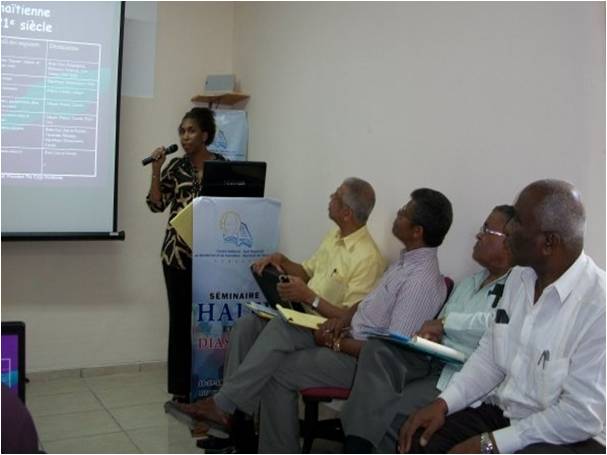
Katleen Felix presenting at Seminaire CENAREF in Port-au-Prince, Haiti.
“The resources are limited in the Diaspora. Even with all the good intentions, some might not have the capacity to keep up with the increasing demand of cash without weakening their own finances. There is a need to create small businesses that can create livelihood. Some members of the Diaspora have decided to invest and come to Haiti to provide technical assistance to their family and friends in very informal ways.
“We have also collective remittances through Haitian Hometown Associations which are started by supporting humanitarian work such as helping an orphanage, a school, or at church. These associations are now investing in productive projects that are generating revenues for the communities. These efforts are a little bit more organized, but yet need training and support to grow the businesses.
“This is why we created Zafen – to showcase those types of effort, help them find funding, and have a bigger impact in their community. This is not only a fundraising tool but a program where business analysts will give them training and be an agent of change for those communities. We work closely with the Haitian Hometown Associations Resource Group to identify joint projects and communities that are trying to get out of the cycle of dependency and poverty.”
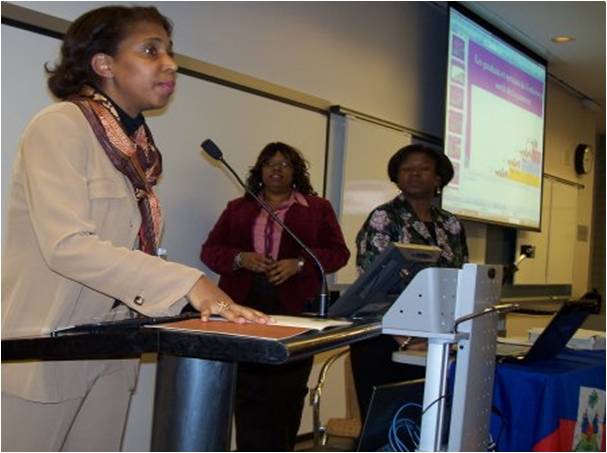
Katleen Felix of Fonkoze and Zafen frequently speaks to audiences around the world.
The reality is that 80% of Haitian professionals have left Haiti over the years, leaving a hole in their hometown. Mechanisms to give back are needed for those professionals. It is not a donation from the host country – who benefit from those resources – to help the Diaspora organize, it is due to a Haiti that has been an international donor of brain for decades.
Unfortunately, we don’t see a lot of international donors recruiting from the Haitian Diaspora or facilitating experts from the Diaspora to come back to help. The Ministry of Haitians Abroad is trying to put together a program to support the return or the contribution of Haitian experts from abroad. If this program happens, we will see a more organize contribution of the Diaspora in to the country.
“At the level of organizations like Fonkoze we need try to find resources within the Diaspora, sometimes we get lucky but not everybody is ready to move back or have enough country experience to take the job. The reverse migration is a nice concept but we need mechanisms to support the migrant it that journey.”
Haitian-American Evens Anozine of New York City wears several hats, representing Orphans International Worldwide, We Can’t Have That Foundation, and NYU Polytechnic’s GreenLight Innovations. Evens says:
“As a Haitian-American it is imperative that we find ways to give back to Haiti. However, we must ensure that our effort is not in vain. All Haitian-Americans, whether they were born in the U.S. or having been born in Haiti, have an affinity for our beloved island. The culture, the music, the people and the food – especially food like Duri ak Sauce Pwa , Lambi avek Griots!
“We now have to find ways to participate with the “development” of Haiti. All of us can make a difference. The Diaspora is a community that has yet to be tapped properly, approximately about four million Haitians are living outside of Haiti. Collectively, we send home over a billion dollars annually.
“I can remember, my Mom and Dad working two jobs not only take care of my two sisters and I but also to help family members back home. With no education, my parents sacrificed their lives to make sure that ours would be better. For many years, I only saw my father on Sundays. This is something you will find in every Haitian household. I believe parents have to encourage their children to find ways to help Haiti.
“Unfortunately there are many parents who discourage their young adults to travel to Haiti prior to the earthquake and even now. As a matter of fact, on our most recent trip to Haiti, we were supposed to be accompanied by a young Haitian doctor, but her family actively discouraged her from traveling, pointing out security reasons among many.
“With Wyclef Jean possibly running for president, I believe there will be renewed hope among Haitian-Americans to travel home to help. I hope he has a clear concept as to how he will contribute to the country and help propel the Haitian people to a new way of life. His “TEAM” of leaders will also make a big difference. The people of Haiti need our help now, the work that all of us are doing across Haiti is of utmost need. What we do today, will resonate a thousand years from now. I truly believe that the future of Haiti is in our hands.”
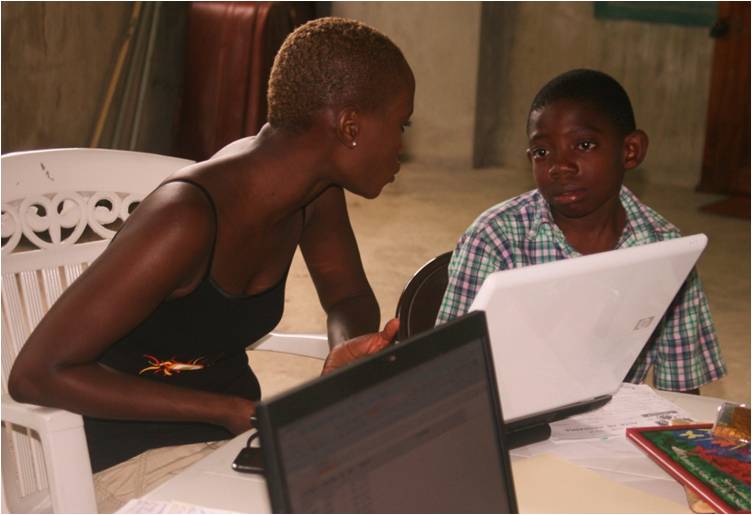
Deborah Pierre assisted OIW in Leogane match orphans with mentors for OIW.
Deborah Pierre, a Haitian-American artist representative also living in New York but originally from Port-au-Prince, told me on the trip and expounded on at the Gramercy Park Hotel‘s roof-top Rose Bar a week later:
“Haiti has always been close to my heart. It is where I grew up, spent my childhood. Our culture, our history, education, and our way of life were deeply installed in me. Haiti is my country.
“I have been interested in helping kids in Haiti for many years. I adopted a little girl 12 years ago who is now 16 years old and extremely smart, then I adopted another little girl 6 years ago when my aunt told me her mom was about to commit suicide with her. She is now 7 years old and lovely.
“The people and the children of Haiti have always needed our help. The earthquake of January 12, 2010 brought an awareness worldwide — but we have been a suffering nation for many, many years.
“When I think about what it is to go to Haiti to give back, I feel it is my duty. When I look at these kids I see me — It could have been in their place but chance gave me a different path to life. It’s only chance!
“I don’t know much about politics and government, but I do know that education plays a major role if not the most important one in a child’s upbringing. During my recent trip to Haiti while interviewing those kids I saw a thirst for knowledge in their eyes, a need for love, a sense of belonging and many of them wondered if there would be a future for them.
“These children need a voice — and if I can be one fraction of that voice to help them, it is the least I can do. Because what I care about most is Haiti’s kids – they are our future. I feel that if we can help them as Haitian-Americans we are ensuring that we will have a better nation down the road. I love Haiti and her children and want to play a role in the creation of a New Haiti.”
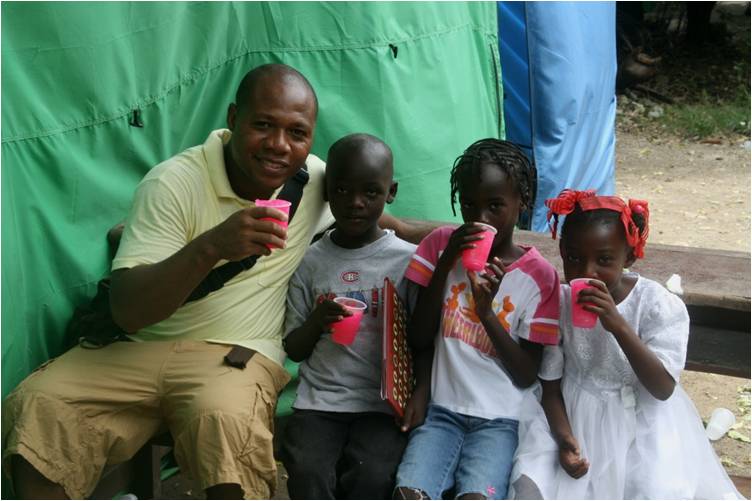
Like most Haitian-Americans, Handal Murat is bi-cultural and tri-lingual – and loves kids.
Handal Murat, a medical supplies specialist from Connecticut, grew up in Petionville outside Port-au-Prince. He explained why he went on the trip:
“Having witnessed the international community‘s immediate and overwhelming response to our country in its desperate time of need; I felt as a native Haitian living abroad the obligation to roll up my sleeves and also help. Not going to volunteer was never an option for me. It was more a matter of when. While I know that many Haitians living abroad can’t physically make the trip, I encourage them to help by supporting local fundraisings, supply drives, and even sponsoring an orphaned child.
The news media has left Haiti and the rest of the world will inevitably go back to their lives. Haitians in the Diaspora play a vital role in rebuilding Haiti because of our deep and lasting ties to our beloved country. Many of us still have cousins, aunts and other extended family members living there.
I gained more from the trip than I gave. The resilience and hope of the people is contagious. After touring the destruction in Port-au-Prince and Léogâne, walking through the tent cities and interviewing many of the orphans, I returned home with a totally new perspective of what’s really important.
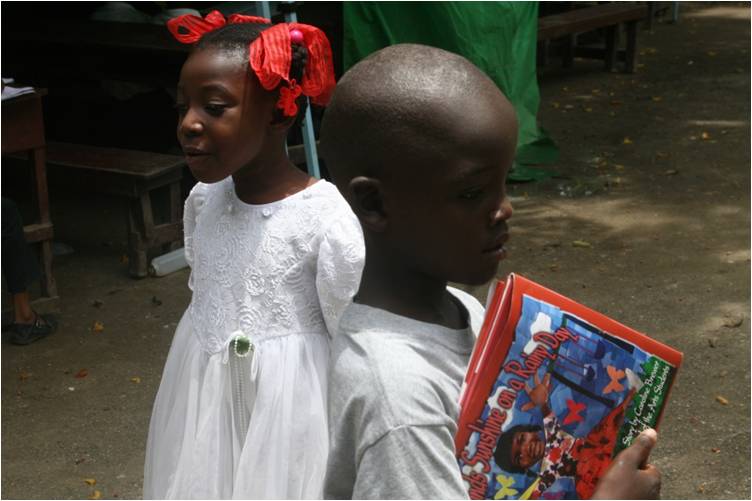
For Haitian-Americans, just like it is for all of us, the motivation comes from seeing the results.
The programs Orphans International Worldwide runs in Léogâne include family care for orphaned children, academic scholarships for orphaned students not in family care, and a college leadership mentoring program. There are approximately 100 students in each program.
It seems obvious to this non-Haitian writer that the New Haiti, rising from the ashes of the earthquake, will succeed only with the full support of the Diaspora. Haitian-Americans are called to embrace their moral and social obligations. And they are doing so.
Originally published in The Huffington Post, Aug 20, 2010.
Related Stories by Jim Luce:
- Trip to Haiti #22: Some Changes at Bottom, Same Old Stuff at Top
- Zafen: New Interest-Free Microloan Initiative Launched for Haiti
- Airplane Interview with the American Ambassador to Haiti
- Fonkoze Helps Rebuild Haiti through Microfinance Following Earthquake